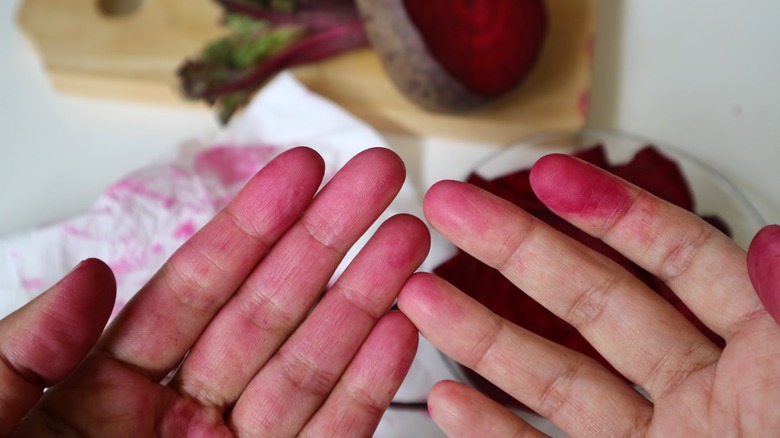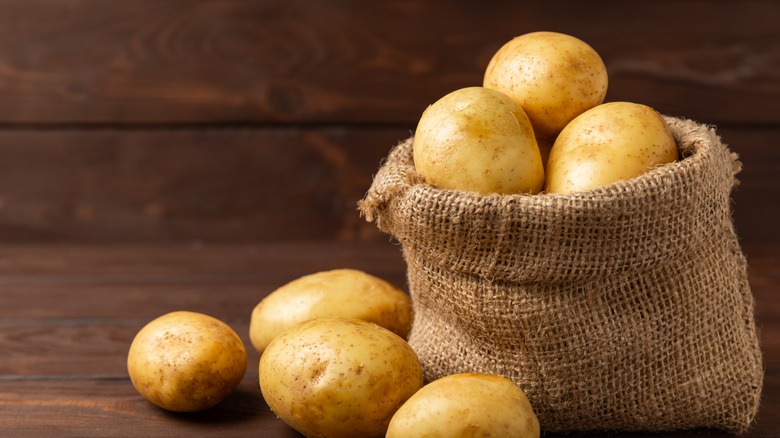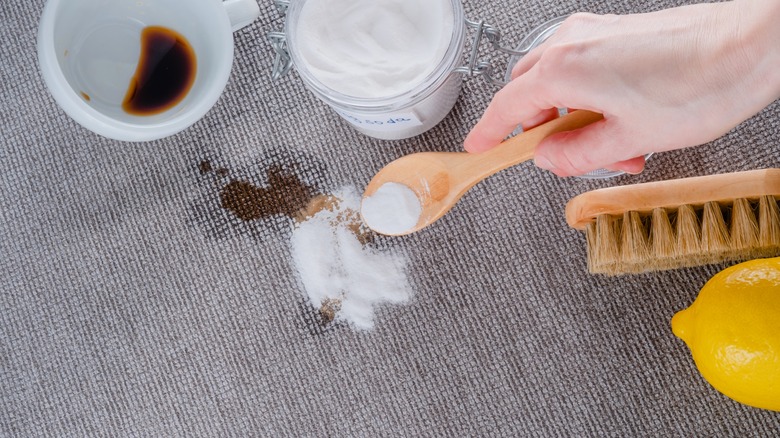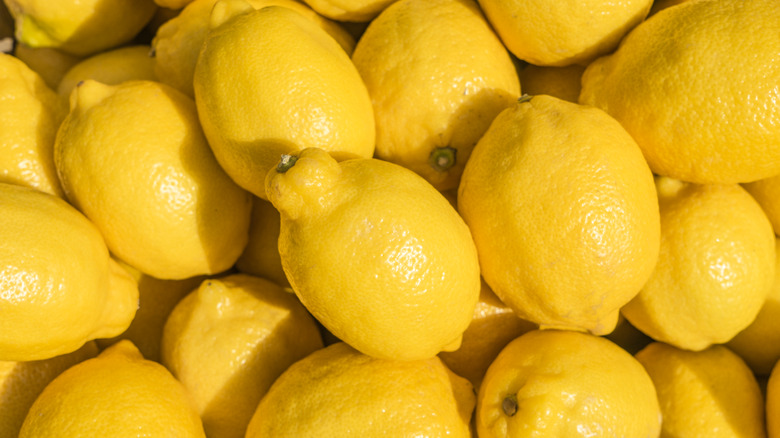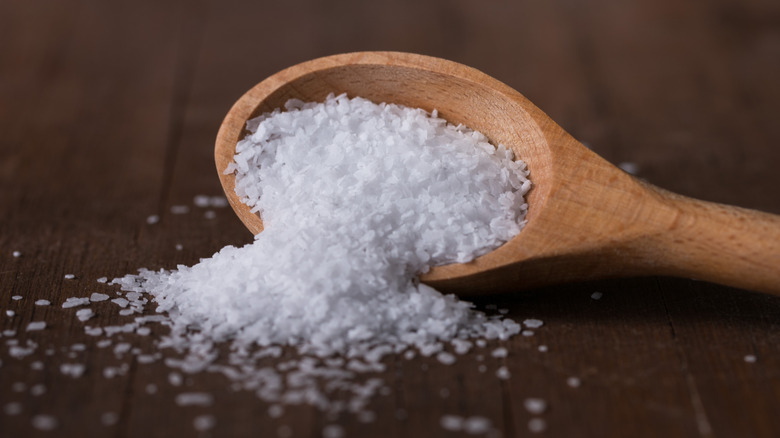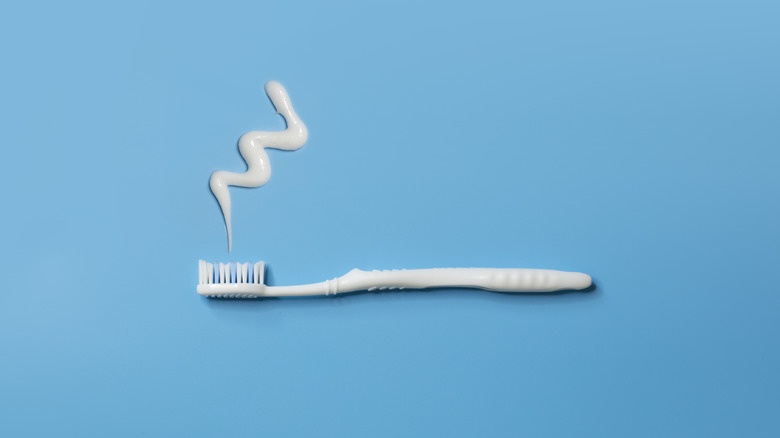The Unconventional Tricks You Need To Remove Beet Stains From Your Hands
Beets are a wonderful thing. The sweet, earthy root vegetable is sure to bring something special to almost any recipe, and with a punchy pink color to boot. A bowl of Borscht, for example, wouldn't carry the same appeal without its vibrant hue, and beets add a wonderful splash of color to any salad worth its mustard greens (just try adding roasted beets to a goat cheese salad, it might just change your salad game forever). On the other hand, that signature color, while bringing a fun kick to food, is not so welcome on, say, your hands.
Yet for many home cooks, stains are simply the price one pays for a taste of the hearty beet. However, you need not resign yourself to such a fate. In fact, there are quite a few ways to remove those pesky pink stains from your fingers and palms, some of which might just surprise you. And more than a few include ingredients and items that are already in your kitchen! From lathering your hands in lemon juice to exfoliating with salt, you'll have those beet stains off in no time.
Remove stains with potatoes
Like their root vegetable cousins, potatoes bring a hearty and distinct taste to whatever they're added to. In fact, the humble potato is often considered the workhorse of the vegetable family for its versatility in the kitchen. But its versatility goes far beyond your dinner plate. In fact, potatoes can be quite the nifty tool for removing stains from your hands, and potatoes are especially handy for getting rid of those ever-so-vibrant beet stains, too.
To make the most of your potatoes' stain-removing capabilities, simply slice your potato in half and rub it on the stained portion of your hands under running water. To amp up the stain-removing power, you can add salt to your potato. This will help to exfoliate your skin, therefore removing the stain. How potatoes help to remove stains as stubborn as those from beets comes down to chemical content. Raw potatoes contain oxalic acid, which is a natural stain remover. Moreover, the starches in potatoes help to remove stubborn stains. So you might want to keep a few potatoes around, and not just for mashing.
Create a paste with baking soda
Baking soda is a product that is widely known for its multipurpose nature. In addition to its use in baking projects, or as a great addition to your next pot of coffee, baking soda is also a great household cleaner (and can even be used to remove stubborn adhesive labels from your glassware). So it's no surprise that baking soda can also be used to remove those pesky pink beet stains from your hands. This is all thanks to its alkaline composition, which helps to diffuse the staining substance from surfaces. Its stain-removing powers make baking soda a go-to product for removing household stains from furniture and clothing. And this cleaning power extends to your skin as well.
To put baking soda to work on your hands, simply combine your baking soda with a bit of water and mix, forming a paste. Then, apply the paste to your hands and scrub until the stains are fully removed. Once the baking soda is fully rinsed, you should moisturize your hands, as baking soda can be harsh on your skin.
Rub your hands with lemon
Now let's go from alkaline baking soda to acidic lemons. On the opposite end of the pH spectrum, lemons can also be used to remove beet stains from your hands. Simply cut your lemon in half and rub its interior over the stained portion of your hands. Then, once fully scrubbed, rinse your hands under water. This trick should work quickly to lift those stubborn marks from the surface of your skin.
The acidity of lemons helps to remove stains by turning otherwise neutral (not positive or negatively charged molecules) into ions that have a positive charge. This positive charge causes your staining molecules to then become attracted to the water you use to rinse. Et voila! Your beet stains will rinse right down the drain. It should be noted, however, that those with sensitive skin or conditions such as eczema should avoid this hack, as lemon juice can irritate the skin, causing further irritation to the inflamed area.
Exfoliate with salt
What is the price of salt? Well, not all that much considering its multitude of functions. Whether you're looking to amp up the flavor of your soup or soothe irritated skin in a bath, salt can be your go-to. In addition to these purposes, salt also makes a great cleaner and stain remover. Thanks to its rough texture, salt is great for scrubbing away stains (and mildly exfoliating skin). Additionally, salt is absorbent, which means it can pick up the pink stains left by beets. To use, simply sprinkle salt over the stained portion of your hands and scrub. Then, once fully scrubbed, rinse the salt (and the stains) from your hands.
If you want to really amp up your salt's cleaning power, you can add it to the other stain removers listed above. Salt can add exfoliation to the cleaning power of lemon and potatoes, for example. This can ensure that your hands are fully beet-stain free and, thanks to the scrubbing power of salt, baby soft and smooth.
Try removing stains with toothpaste
Now, this choice might seem out of left field, and you probably won't be able to find it in your kitchen cabinets. However, you will find it in your bathroom. Toothpaste, that tube of oral hygiene with a minty scent, can come in a clutch when looking to remove stubborn beet stains from your skin. Toothpaste makes for a fantastic cleaning agent thanks to ingredients such as silica, dicalcium phosphate, and baking soda, which are all slightly corrosive. This helps when removing plaque and stains from teeth, and also works for stubborn stains on the skin as well. Some toothpastes also contain hydrogen peroxide, which can help to remove stains.
To use toothpaste as a beet stain remover, simply use it as you would hand soap, by squeezing a small amount into wet hands and scrubbing. Then, once your hands are fully sudsed up, rinse the toothpaste, and the stains, away. You might even be left with some delightfully minty hands as well. And that's always a bonus.
